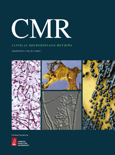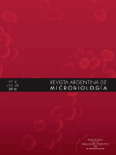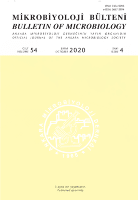
CLINICAL MICROBIOLOGY REVIEWS
Scope & Guideline
Unraveling the complexities of infectious diseases.
Introduction
Aims and Scopes
- Clinical Microbiology and Infectious Disease Management:
Focuses on the diagnosis, treatment, and prevention of infectious diseases, providing updates on clinical practices and laboratory methods. - Antimicrobial Resistance and Stewardship:
Addresses the growing concern of antimicrobial resistance, exploring mechanisms, implications for treatment, and strategies for stewardship in clinical settings. - Microbiome Research:
Investigates the role of the human microbiome in health and disease, emphasizing its implications for treatment and prevention strategies. - Emerging Pathogens and Public Health Concerns:
Covers newly identified pathogens and their public health implications, including responses to outbreaks and the development of vaccines. - Innovative Therapeutic Approaches:
Highlights novel treatment modalities and technologies, including phage therapy, mRNA vaccines, and bioengineering strategies for infectious disease management. - Clinical Laboratory Innovations:
Focuses on advancements in laboratory diagnostics, biosafety, and methodologies that enhance the detection and management of infectious diseases.
Trending and Emerging
- COVID-19 and Viral Infections:
Research related to COVID-19, including diagnostics, treatment strategies, and public health responses, has seen a significant increase following the pandemic. - Microbiome and Health Interactions:
The exploration of the human microbiome's role in health, disease, and therapeutic outcomes is gaining traction, highlighting its importance in clinical practice. - Innovations in Vaccine Development:
There is a growing emphasis on novel vaccine technologies, particularly mRNA vaccines, in response to emerging infectious diseases and public health needs. - Antimicrobial Resistance Strategies:
A heightened focus on understanding and combating antimicrobial resistance, including novel therapeutic approaches and stewardship practices, is emerging. - Public Health Surveillance and Preparedness:
Research on surveillance methodologies, including wastewater-based surveillance and responses to outbreaks, is increasingly relevant in the context of global health security.
Declining or Waning
- Traditional Antibiotics:
Research on conventional antibiotic treatments is declining as the field pivots towards exploring alternatives and addressing antibiotic resistance. - Non-Emerging Infectious Diseases:
Infectious diseases that have been historically well-managed (e.g., certain bacterial infections) are receiving less attention compared to emerging threats like COVID-19 and antimicrobial resistance. - Basic Microbiology Research:
There is a noticeable shift away from fundamental microbiological studies towards more clinical and applied research, reflecting the journal's focus on direct clinical implications. - Single-Pathogen Studies:
Focus on studies of individual pathogens is waning as there is a growing interest in co-infections, interactions within the microbiome, and systems biology approaches.
Similar Journals

Mediterranean Journal of Infection Microbes and Antimicrobials
Advancing knowledge in infection and microbiology.Mediterranean Journal of Infection Microbes and Antimicrobials is a distinguished open-access journal published by GALENOS PUBL HOUSE, dedicated to advancing the understanding of infectious diseases and microbiology. Since its inception in 2011, this journal has been a vital resource for researchers, professionals, and students interested in the intricate world of microbes and their impacts on human health. With its ISSN 2147-673X, the journal has progressively gained visibility, although it currently holds a Q4 ranking in multiple categories including Immunology and Microbiology, and Infectious Diseases for the year 2023. The journal operates from its headquarters in Istanbul, Turkey, and features a rich array of articles that contribute to the field’s body of knowledge. As a platform enhancing the accessibility of research, it invites submissions from global contributors to foster collaboration and innovation in tackling microbial challenges.

New Microbes and New Infections
Innovating solutions for a healthier tomorrow through microbial research.New Microbes and New Infections is an esteemed peer-reviewed journal published by Elsevier Sci Ltd that has been a prominent platform for disseminating groundbreaking research in the fields of Infectious Diseases and Microbiology since its establishment in 2013. With an impressive Open Access model, this journal ensures that vital research findings are readily accessible to researchers, healthcare professionals, and academics worldwide. Positioned in the Q2 category for Infectious Diseases and Q3 for Microbiology in 2023, it reaches a significant global audience, as demonstrated by its high Scopus rankings—#44 out of 344 in Medicine: Infectious Diseases, and #34 out of 182 in Immunology and Microbiology. The journal aims to inspire new ideas and foster collaborations by publishing high-quality research focused on novel microbes and infections, thus playing a crucial role in advancing science and public health in an era where understanding infectious agents is more vital than ever.

REVISTA ARGENTINA DE MICROBIOLOGIA
Championing the dissemination of vital microbiological discoveries.REVISTA ARGENTINA DE MICROBIOLOGIA, published by the ASOCIACION ARGENTINA MICROBIOLOGIA, stands as a prominent open-access journal in the field of microbiology and medicine since its establishment in 1979. With an ISSN of 0325-7541 and an E-ISSN of 1851-7617, this journal has paved the way for disseminating high-quality research while enhancing accessibility for academics and practitioners worldwide. The journal has achieved notable rankings, being classified in Q3 for Medicine (miscellaneous) and Q3 for Medical Microbiology in 2023, reflecting its commitment to advancing knowledge in these critical areas. Despite its relatively modest impact factors, it occupies a vital niche in the academic landscape, fostering collaborations and innovative research among experts. With Open Access available since 2013, REVISTA ARGENTINA DE MICROBIOLOGIA not only facilitates widespread distribution of valuable scientific information but also empowers researchers, professionals, and students to stay abreast of the latest findings and developments in microbiology. For those engaged in the evolving realm of microbiology, this journal serves as an essential resource for sharing insights and advancing the scientific community.

Microbiology Research
Fostering Collaboration in Microbial InnovationMicrobiology Research, published by MDPI, stands as a pivotal open-access journal in the field of microbiology, having established its presence since 2010. Based in Switzerland, this journal strives to provide a platform for innovative research and cutting-edge findings in various branches of microbiology, including medical microbiology and molecular biology. With an impact factor that reflects its dedication to scholarly excellence, Microbiology Research is classified in the Q3 category for both microbiology and medical microbiology, and Q4 for molecular biology as of 2023, indicating its growing importance and outreach within these domains. The journal aims to foster discussion and collaboration among researchers, professionals, and students by presenting articles that cover a wide array of topics and methodologies in microbiological research. Leveraging its open-access model, Microbiology Research ensures that high-quality research is accessible to a global audience, thus facilitating the advancement of knowledge and innovation in the microbial sciences.

Infectious Microbes & Diseases
Advancing the frontiers of infectious disease research.Infectious Microbes & Diseases, published by Lippincott Williams & Wilkins, is a premier journal dedicated to the exploration and understanding of infectious diseases, microbiology, and epidemiology. With its focused scope and robust peer-review process, the journal aims to disseminate high-quality research that contributes to advancements in the field, making it an essential resource for researchers, healthcare professionals, and students alike. Established in 2019, it has quickly gained recognition, achieving a Q3 rating in categories such as Epidemiology, Infectious Diseases, and Medical Microbiology in 2023, and ranking in the top half of its field within Scopus metrics. Although currently offered as a subscription-based journal, Infectious Microbes & Diseases significantly enriches its disciplines by inviting innovative research and critical review articles, thus playing a vital role in combating the global challenges posed by infectious diseases.

Infectious Diseases and Clinical Microbiology
Fostering collaboration in the fight against infectious agents.Infectious Diseases and Clinical Microbiology is a pivotal journal dedicated to advancing our understanding of infectious diseases through rigorous scientific research and clinical practices. Published by DOC DESIGN INFORMATICS CO LTD, this journal serves as a vital platform for researchers, healthcare professionals, and students keen on enhancing their knowledge of microbiological sciences and the clinical implications of infectious agents. With an ISSN of 2667-646X, it aims to disseminate significant findings in the field, enriching the scholarly dialogue surrounding infectious diseases. While currently operating under a traditional access model, the journal encourages global collaboration and knowledge sharing, striving to make a meaningful impact in tackling the challenges posed by infectious diseases. Its content aims to bridge the gap between laboratory research and clinical application, making it an essential resource in the contemporary landscape of global health.

Revista Espanola de Quimioterapia
Transforming Research into Real-World ImpactThe Revista Espanola de Quimioterapia, published by the SOCIEDAD ESPANOLA QUIMIOTERAPIA, is a pivotal open-access journal that has been advancing the field of clinical microbiology and pharmacology since its inception in 1989. With an E-ISSN of 1988-9518, this journal caters to a diverse audience of researchers, healthcare professionals, and students, providing them with critical insights into the latest developments in medicinal chemistry and therapeutic strategies. Located in Madrid, Spain, the journal reflects the rigorous academic standards of its associated institutions, contributing significantly to the translation of research into clinical practice. Achieving a Q3 ranking in the fields of Medicine, Microbiology, and Pharmacology in 2023 attests to its growing influence and relevance in the scientific community, making it a vital resource for those engaged in the quest for innovative solutions to pressing healthcare challenges. The journal prides itself on its commitment to maintaining an open-access model since 2018, ensuring that vital research is freely accessible to foster greater knowledge sharing and collaboration within the global scientific community.

MICROBIOLOGY AND IMMUNOLOGY
Unveiling the Secrets of Pathogens and Immune ResponsesMICROBIOLOGY AND IMMUNOLOGY, an esteemed journal published by WILEY, serves as a vital resource for researchers and professionals in the fields of microbiology, immunology, and virology. With its ISSN 0385-5600 and E-ISSN 1348-0421, this journal has been a cornerstone in scientific literature since its inception in 1977, bridging decades of research and innovation through its comprehensive coverage of emerging trends and discoveries. Although this journal operates without open access, it maintains a commendable presence in academic circles, reflected in its 2023 Quartile rankings of Q3 across the categories of Immunology, Microbiology, and Virology. As part of an important discourse in these disciplines, MICROBIOLOGY AND IMMUNOLOGY ensures its scholarly contributions are relevant to both seasoned researchers and emerging scholars. Positioned in a competitive journal landscape, with Scopus ranks indicating a median percentile across its fields, it remains committed to advancing knowledge through peer-reviewed articles, thereby supporting the continuous evolution of its focus areas. The journal's current scope encompasses topics critical for understanding pathogen-host interactions and the immune response, making it a crucial publication for any academic library or individual scholar dedicated to the biological sciences.

Gut Pathogens
Exploring the Nexus of Gut Health and Infectious DiseasesGut Pathogens, published by BMC in the United Kingdom, is a premier open-access journal focusing on the intersection of gut health and infectious diseases. With its impact firmly established since its inception in 2009, the journal has earned impressive rankings, including Q1 in renowned categories such as Gastroenterology, Infectious Diseases, Microbiology, and Parasitology, while maintaining a strong presence in Virology. The journal serves as a vital resource for researchers, professionals, and students interested in the intricate relationships between gut microbiota and pathogenic organisms, offering insights that drive advancements in treatment and prevention strategies. By providing unrestricted access to high-quality research, Gut Pathogens fosters a collaborative environment, encouraging the dissemination of knowledge and innovation within the field. The journal publishes original research, reviews, and case studies, all designed to address contemporary challenges in gut health, ultimately aiming to improve patient outcomes and public health worldwide.

MIKROBIYOLOJI BULTENI
Elevating Scientific Discourse in MicrobiologyMIKROBIYOLOJI BULTENI, with ISSN 0374-9096, is a prestigious academic journal published by the ANKARA MICROBIOLOGY SOC, located in Ankara, Turkey. Established in 1973, this journal has been a vital conduit for disseminating research in the fields of Immunology, Microbiology, and Infectious Diseases, garnering a reputation as a significant contributor to the scientific community. The journal is currently ranked in the Q3 category within Immunology and Microbiology (miscellaneous), and Infectious Diseases, indicating its impactful presence amidst contemporary research. With access options that may be restricted, MIKROBIYOLOJI BULTENI actively welcomes submissions that advance the understanding of critical microbiological principles and practices, thereby supporting both national and international research efforts. Researchers, professionals, and students are encouraged to explore the latest findings shared in this journal, as it continually shapes the landscape of microbiology and infectious disease studies through its comprehensive and rigorous peer-reviewed publications.